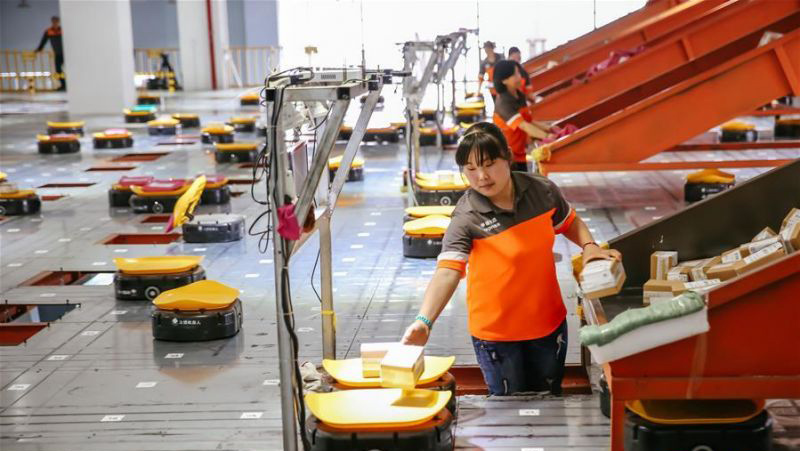Scholars: Robots have short, long-term influence on jobs

A staff member of Shentong Express uses small robots similar to floor mopping robots in appearance to sort packages. Such highly efficient robots sparked heated discussion on whether robots are taking human jobs.
Recently, images of sorting robots used by Shentong Express have gone viral. These robots, capable of sorting nearly 20,000 packages per hour, sparked heated discussion on the replacement of human workers with robots. Prior to this, the automation of written articles triggered concerns about the unemployment of journalists. In this context, Chinese scholars suggested correctly understanding the influence of robots on employment.
Challenges
Yi Dinghong, a professor of labor and human resources from Renmin University of China, said industrial robots, mainly applied in manufacturing, and intelligent robots could replace human workers. The influence of industrial robots on employment in the manufacturing industry is already apparent and tends to be stable, he said.
It will be a while before intelligent robots have reached the point where they can replace complex labor, thus they have little influence on employment in the short term, Yi said, but they will pose a greater challenge to white-collar jobs in the long run.
Lai Desheng, director of the Business School at Beijing Normal University, said though robots will inevitably replace some labor in the long run, humans can still get stronger both physically and intellectually, citing an example that human power became stronger despite the application of electric power after the steam engine was invented. He pointed out that China may face greater pressure because increased cost of labor and other factors have motivated many enterprises to innovate in robotics.
Complementation
The application of robots has also brought opportunities that call for higher-quality human resources and impel people to engage in more complex and creative work, said Chen Jin, a professor from the School of Economics and Management at Tsinghua University, adding that this is conducive to human development.
Lai said robots have enhanced labor productivity, a manifestation of technological progress. He pointed out that robots are sometimes complementary to people, and ignorance of this fact causes many to worry about the rise of robots. In fact, robots can also play a cooperative role in employment, he added.
Enhancing creativity
In response to the challenges, Chen suggested further improving higher and vocational education, including support for artisan craftsmanship, to avoid simple and repetitive employment. It is necessary to adjust and optimize the arrangements of majors to cultivate more creative talent, he added.
Lai noted that the application of robots can to some extent compensate for the gap caused by the decrease in demographic dividend. He suggested thinking over how to create and make good use of “robotic dividend.” He said robots have promoted progress in productive forces, which in turn would give rise to reforms in productive relations. Therefore, institutional innovation is needed to adapt to the reform.
In terms of career choice, Yi suggested choosing jobs that have higher requirements on creativity and are less likely to be replaced. In addition to teaching knowledge, future education should focus on fostering scientific and creative ways of thinking, he said.
Pan Yuefei is a reporter at the Chinese Social Sciences Today.
